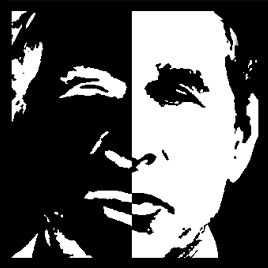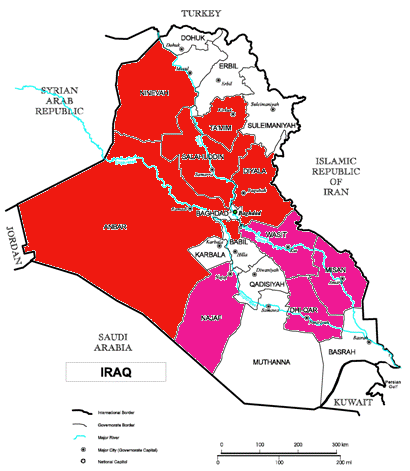Letter to a Marine Reserve Officer
This is a piece of private correspondence with a thoughtful reserve officer who kindly took the time to remonstrate with me about comments he took to be "anti-military" on my web log.
Dear . . .
I can't thank you enough for your detailed and (under the circumstances) gentlemanly letter, which I read with great attention.
Let me try to clear away what I think is a misconception. I am not anti-US military. My father spent 20 years in Signal Corps and then Sat Com in the army, and I grew up on bases. I have also . . . had interactions with officers here (where they are sometimes detailed to do an MA with us) and elsewhere. I have the greatest respect for the intelligence, culture and initiative of the US officer corps, and I am grateful to the Marines and the other services for defending our country. I thank you for your own service.
There are nevertheless things I don't like about the way the Iraq war is being prosecuted. I don't doubt that much of this is at the behest of "General Rove" and is by no means the fault of the military itself. They after all have to shoot where they are told to. Nevertheless, I do feel a need to speak out when I see things going wrong. That is my function as an analyst of the scene, and not to do it would be a dereliction of duty. And, sometimes the only way to make a strong point is to make it rudely.
One reason for my vehemence is that I think the US is walking a tight rope in Iraq. The Americans seem not to realize it, but it is entirely possible that the Iraqis will mount a nationwide urban revolutionary movement aimed at expelling the US. At that point the US military will be faced with a choice of committing massacres (as the Shah's troops did at Black Friday in 1978) or leaving. Neither eventuality will lead to anything good.
I wasn't on the scene at Haifa street and found the footage confusing, so I just don't know what happened there. But whatever it was doesn't smell right from the eyewitness accounts we have in the European and Arab press. I'd love to have your reaction to the suggestion made to me by one correspondent that the Bradley might have had some sort of intel equipment aboard and that was why it was important that it be completely destroyed before the guerrillas could loot it.
In general, as you can tell, I deeply disagree with using helicopter gunships and warplane bombardment of civilian neighborhoods as key tactics in fighting urban guerrillas. If the LAPD bombed Watts to get at the Cripps and the Bloods, there would be outrage. (In fact, that sort of thing was done in Philly with regard to MOVE and did cause outrage). You can't attack urban areas that way without killing a lot of innocent people. It isn't right, and I suspect it is a violation of the 4th Geneva Convention. It is also politically inadvisable, since the people you are bombing in Kut and elsewhere started out only having a few guerrillas amongst them, but are pushed into vehement anti-Americanism by seeing their relatives killed this way.
My angry comments on Najaf derived from several sources. Mostly I was upset by the fighting in the holy city. It really, really angered all my Shiite friends and had geopolitical repercussions as far abroad as my old stomping grounds in Lucknow, India. After 9/11, surely it should by now be apparent that the US cannot act with impunity in the Muslim world, and right now we don't need Shiite enemies alongside our Sunni and Wahhabi ones.
If it were true, as John Burns alleged, that the most recent round of fighting was set off by local Marine decisions, then that was most unwise. It may be, as you imply, that Burns was wrong, and that the policy was set higher up, and the Marines were only following orders. But it is actually unclear that Washington would have wanted a major fight in a sacred space just before the Republican National Convention, and I am inclined to credit Burns on this.
It seems obvious to me that the US military was perfectly willing to storm the Shrine, and indeed many were itching to do so. The Washington Post quoted one Marine as saying that the shrine "might not be there much longer."
That was the ignoramus, along with his like-minded colleagues, to whom I was mainly refering.
I know very well that the US officer corps knows about the significance of Najaf and Karbala . . . The problem is that they don't know about that significance in their *guts*. It is still intellectual for them, as it obviously is for you. The Shrine of Imam Ali is, by the way, not a mosque, though a mosque is attached to it. It is a mausoleum.
That Muqtada's guys were in the shrine did not necessitate the Marines storming the Shrine of Ali, which was clearly at some points envisaged. First of all, the Mahdi Army did not even control Najaf in March of 2004-- it was mainly in the hands of Badr Corps. It was the stupid American decision to "kill or capture" Muqtada in early April that led to his movement ensconcing itself in Najaf. So having caused the problem in the first place, the American solution to it was to piss all over the most sacred mausoleum in Shiite Islam. That is willful ignorance, I am afraid.
I am sure the local Marine commanders were manipulated by Adnan Zurfi and the Najaf elite, and probably Allawi as well. (A . . . State Department official intimated to me that Allawi was mainly behind it and Negroponte's hands were tied). But, again, if the initiative came as Burns claims from local commanders, then what they did was most unwise (the polite way of putting it).
There are some things that the US should not do, period. Besieging Najaf and bombing the sacred cemetery is one of them. The whole city and its environs are holy, not just the shrine. It is very nice for Zurfi and Allawi if they can get us to do it, but we should resist being used that way.
Not only were all the Shiites in southern Iraq outside Najaf itself angered by the fighting in Najaf, but so were the Lebanese, Bahrainis, Iranians, Pakistanis, and Indians. An operation would have to be really important and urgent to make it worthwhile alienating 120 million people. I didn't see the urgency. Most of the cities in Iraq are not under US control and are patrolled by militias. If you were going to pick a fight, Ramadi or Kut would have been preferable, because they lack the "gut" factor.
And, it is precisely by injuring these religious feelings that the US hastens the day when the Iraqi public comes out into the streets in the hundreds of thousands and begins the revolution for Iraqi independence.
For "cont'd" postings, click here.






 |
|
 Facebook
Facebook




